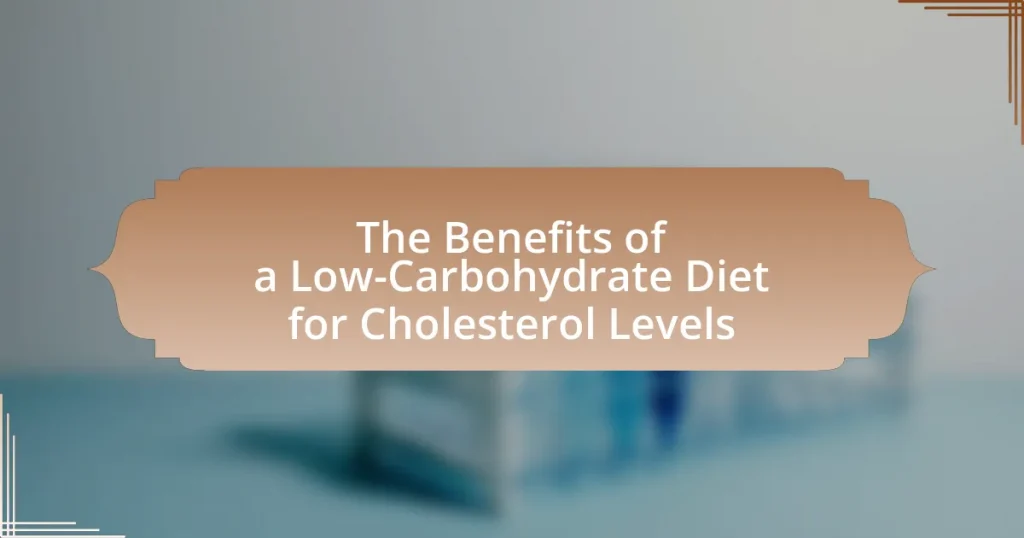A low-carbohydrate diet is a dietary approach that restricts carbohydrate intake while promoting higher consumption of proteins and fats. This article explores the benefits of such a diet specifically for cholesterol levels, highlighting how it can lead to increased high-density lipoprotein (HDL) cholesterol and reduced triglycerides, thereby improving cardiovascular health. Key components of a low-carbohydrate diet, its effects on metabolic health, and the importance of monitoring cholesterol levels are discussed, along with scientific studies that support these findings. Additionally, potential risks associated with this dietary approach and practical tips for implementation are provided to ensure individuals can effectively manage their cholesterol levels while following a low-carbohydrate diet.

What is a Low-Carbohydrate Diet?
A low-carbohydrate diet is a dietary approach that restricts carbohydrate intake, focusing instead on higher consumption of proteins and fats. This type of diet typically limits foods such as bread, pasta, and sugary snacks while encouraging the intake of meat, fish, eggs, dairy, and non-starchy vegetables. Research indicates that low-carbohydrate diets can lead to significant weight loss and improvements in metabolic health, including better cholesterol levels, as evidenced by studies showing reductions in triglycerides and increases in HDL cholesterol.
How does a Low-Carbohydrate Diet differ from other diets?
A Low-Carbohydrate Diet differs from other diets primarily by its significant restriction of carbohydrate intake, typically limiting carbs to less than 20-50 grams per day, while emphasizing higher consumption of proteins and fats. This dietary approach contrasts with many traditional diets that often promote a balanced intake of carbohydrates, proteins, and fats without such strict limitations. Research indicates that low-carbohydrate diets can lead to improved cholesterol levels, as evidenced by a study published in the American Journal of Clinical Nutrition, which found that participants on a low-carb diet experienced a greater increase in HDL cholesterol and a reduction in triglycerides compared to those following a standard low-fat diet.
What are the main components of a Low-Carbohydrate Diet?
The main components of a Low-Carbohydrate Diet include high-protein foods, healthy fats, and low-carbohydrate vegetables. High-protein foods such as meat, fish, eggs, and dairy provide essential amino acids while promoting satiety. Healthy fats, including avocados, nuts, seeds, and olive oil, serve as a primary energy source and support metabolic health. Low-carbohydrate vegetables like leafy greens, broccoli, and cauliflower are rich in nutrients and fiber while keeping carbohydrate intake minimal. These components collectively contribute to weight loss and improved cholesterol levels, as evidenced by studies showing that low-carbohydrate diets can lead to significant reductions in triglycerides and increases in HDL cholesterol.
How does carbohydrate restriction affect the body?
Carbohydrate restriction affects the body by promoting fat oxidation and reducing insulin levels, which can lead to weight loss and improved metabolic health. When carbohydrates are limited, the body shifts from using glucose as its primary energy source to utilizing stored fat, resulting in increased ketone production. This metabolic state, known as ketosis, has been shown to enhance fat loss and improve markers of cardiovascular health, including lower triglycerides and higher HDL cholesterol levels. Research indicates that low-carbohydrate diets can significantly reduce body weight and improve lipid profiles, as evidenced by a study published in the American Journal of Clinical Nutrition, which found that participants on a low-carbohydrate diet experienced a 5-10% reduction in body weight and a notable decrease in triglycerides over a 6-month period.
Why is cholesterol important for health?
Cholesterol is important for health because it plays a crucial role in the formation of cell membranes, hormone production, and vitamin D synthesis. Specifically, cholesterol is essential for maintaining the structural integrity of cell membranes, allowing cells to function properly. Additionally, it serves as a precursor for steroid hormones, including cortisol and sex hormones, which are vital for various bodily functions. Research indicates that adequate cholesterol levels are necessary for the synthesis of vitamin D, which is important for bone health and immune function. Therefore, maintaining balanced cholesterol levels is essential for overall health and well-being.
What are the different types of cholesterol?
The different types of cholesterol are low-density lipoprotein (LDL), high-density lipoprotein (HDL), very low-density lipoprotein (VLDL), and intermediate-density lipoprotein (IDL). LDL is often referred to as “bad” cholesterol because high levels can lead to plaque buildup in arteries, increasing the risk of heart disease. HDL is known as “good” cholesterol as it helps remove other forms of cholesterol from the bloodstream. VLDL primarily carries triglycerides, another type of fat in the blood, while IDL is a transitional form between VLDL and LDL. Understanding these types is crucial for managing cholesterol levels effectively, particularly in the context of dietary choices such as a low-carbohydrate diet, which can influence these cholesterol types positively.
How does cholesterol impact cardiovascular health?
Cholesterol significantly impacts cardiovascular health by influencing the development of atherosclerosis, which is the buildup of fatty deposits in the arteries. High levels of low-density lipoprotein (LDL) cholesterol are associated with an increased risk of heart disease, as they contribute to plaque formation that narrows and hardens arteries, leading to reduced blood flow. Conversely, high-density lipoprotein (HDL) cholesterol helps remove LDL cholesterol from the bloodstream, thus providing a protective effect against cardiovascular diseases. Studies indicate that maintaining a balance between LDL and HDL cholesterol is crucial for cardiovascular health, with optimal LDL levels being below 100 mg/dL to minimize heart disease risk.

What are the benefits of a Low-Carbohydrate Diet for cholesterol levels?
A low-carbohydrate diet can significantly improve cholesterol levels by increasing high-density lipoprotein (HDL) cholesterol and reducing triglycerides. Research indicates that individuals following a low-carb diet often experience a rise in HDL, which is beneficial for heart health, while simultaneously lowering triglyceride levels, a risk factor for cardiovascular disease. A study published in the American Journal of Clinical Nutrition found that participants on a low-carb diet had a 10% increase in HDL and a 20% decrease in triglycerides after six months. This shift in lipid profile contributes to a lower risk of heart disease and improved overall cardiovascular health.
How does a Low-Carbohydrate Diet influence LDL and HDL cholesterol?
A low-carbohydrate diet typically leads to an increase in HDL cholesterol and a decrease in LDL cholesterol levels. Research indicates that low-carb diets can enhance the lipid profile by promoting the conversion of LDL particles to a larger, less harmful size, which is associated with a lower risk of cardiovascular disease. A study published in the American Journal of Clinical Nutrition found that participants on a low-carb diet experienced significant improvements in their HDL levels and reductions in triglycerides, which further supports the beneficial effects on overall cholesterol levels.
What changes in cholesterol levels can be expected on a Low-Carbohydrate Diet?
A low-carbohydrate diet typically leads to an increase in high-density lipoprotein (HDL) cholesterol and a decrease in triglycerides, while the impact on low-density lipoprotein (LDL) cholesterol can vary. Studies indicate that individuals following a low-carb diet often experience a rise in HDL levels, which is associated with a lower risk of cardiovascular disease. For instance, a meta-analysis published in the “American Journal of Clinical Nutrition” found that low-carb diets significantly improved HDL cholesterol levels and reduced triglycerides compared to low-fat diets. However, LDL cholesterol may increase in some individuals, but this increase often consists of larger, less harmful LDL particles, which are considered less atherogenic. Therefore, the overall lipid profile improvement on a low-carbohydrate diet can be beneficial for cardiovascular health.
How does weight loss from a Low-Carbohydrate Diet affect cholesterol levels?
Weight loss from a low-carbohydrate diet typically leads to improved cholesterol levels, particularly by increasing high-density lipoprotein (HDL) cholesterol and reducing triglycerides. Research indicates that individuals following low-carb diets often experience a significant reduction in body weight, which is associated with favorable changes in lipid profiles. For instance, a study published in the American Journal of Clinical Nutrition found that participants on a low-carbohydrate diet had a 10% increase in HDL cholesterol and a 20% decrease in triglycerides after six months. These changes contribute to a lower risk of cardiovascular disease, highlighting the positive impact of weight loss through low-carbohydrate diets on cholesterol levels.
What scientific studies support the benefits of a Low-Carbohydrate Diet on cholesterol?
Scientific studies indicate that a low-carbohydrate diet can significantly improve cholesterol levels. For instance, a study published in the “American Journal of Clinical Nutrition” by Hu et al. (2012) found that participants on a low-carbohydrate diet experienced a notable increase in HDL cholesterol and a decrease in triglycerides compared to those on a low-fat diet. Additionally, a meta-analysis conducted by Nordmann et al. (2006) in “Archives of Internal Medicine” concluded that low-carbohydrate diets led to greater reductions in total cholesterol and LDL cholesterol levels over a period of six months. These findings support the assertion that low-carbohydrate diets can positively influence cholesterol profiles.
What were the findings of key studies on Low-Carbohydrate Diets and cholesterol?
Key studies on low-carbohydrate diets have consistently shown that these diets can lead to favorable changes in cholesterol levels. For instance, a meta-analysis published in the “American Journal of Clinical Nutrition” by Hu et al. (2012) found that low-carbohydrate diets significantly reduced triglycerides and increased HDL cholesterol, which is often referred to as “good” cholesterol. Additionally, a study by Nordmann et al. (2006) in “Archives of Internal Medicine” reported that participants on a low-carbohydrate diet experienced a greater reduction in total cholesterol compared to those on a low-fat diet. These findings indicate that low-carbohydrate diets can positively influence cholesterol profiles, contributing to improved cardiovascular health.
How do these studies compare to those on other dietary approaches?
Studies on the benefits of a low-carbohydrate diet for cholesterol levels generally show more significant improvements in lipid profiles compared to other dietary approaches, such as low-fat diets. Research indicates that low-carbohydrate diets can lead to greater reductions in triglycerides and increases in HDL cholesterol, which are crucial for cardiovascular health. For instance, a meta-analysis published in the American Journal of Clinical Nutrition found that low-carbohydrate diets resulted in a 10-15% greater reduction in triglycerides and a 5-10% increase in HDL cholesterol compared to low-fat diets. This evidence supports the notion that low-carbohydrate diets may be more effective in managing cholesterol levels than traditional dietary recommendations focused on reducing fat intake.

What are the potential risks of a Low-Carbohydrate Diet for cholesterol levels?
A low-carbohydrate diet can potentially raise cholesterol levels, particularly increasing low-density lipoprotein (LDL) cholesterol in some individuals. Research indicates that while many people experience improved lipid profiles on low-carb diets, a subset may see elevated LDL cholesterol, which is associated with a higher risk of cardiovascular disease. A study published in the American Journal of Clinical Nutrition found that participants on a low-carb diet had a significant increase in LDL cholesterol compared to those on a higher carbohydrate diet. This variability suggests that individual responses to low-carbohydrate diets can differ, necessitating monitoring of cholesterol levels during such dietary changes.
Are there any negative effects on cholesterol from a Low-Carbohydrate Diet?
A low-carbohydrate diet can lead to negative effects on cholesterol levels for some individuals, particularly by increasing low-density lipoprotein (LDL) cholesterol. Research indicates that while many people experience improved triglyceride levels and increased high-density lipoprotein (HDL) cholesterol on low-carb diets, a subset may see a rise in LDL cholesterol, which is associated with a higher risk of cardiovascular disease. A study published in the American Journal of Clinical Nutrition found that participants on a low-carbohydrate diet had a significant increase in LDL cholesterol levels compared to those on a low-fat diet. Therefore, while low-carbohydrate diets can be beneficial for some, they may have adverse effects on cholesterol for others, necessitating individual monitoring and assessment.
What should individuals be cautious about when starting a Low-Carbohydrate Diet?
Individuals should be cautious about potential nutrient deficiencies and the risk of increased cholesterol levels when starting a low-carbohydrate diet. This diet often restricts fruits, whole grains, and certain vegetables, which can lead to inadequate intake of essential vitamins and minerals. Additionally, some studies indicate that low-carbohydrate diets may raise LDL cholesterol levels in certain individuals, potentially increasing cardiovascular risk. For instance, a study published in the American Journal of Clinical Nutrition found that while low-carb diets can improve triglyceride levels, they may also elevate LDL cholesterol in some participants. Therefore, monitoring nutrient intake and cholesterol levels is crucial when adopting this dietary approach.
How can one mitigate potential risks associated with a Low-Carbohydrate Diet?
To mitigate potential risks associated with a Low-Carbohydrate Diet, individuals should ensure adequate nutrient intake by incorporating a variety of non-starchy vegetables, healthy fats, and lean proteins. This approach helps prevent nutrient deficiencies that can arise from reduced carbohydrate consumption. Research indicates that a well-formulated low-carbohydrate diet can improve cholesterol levels while minimizing adverse effects, as seen in a study published in the American Journal of Clinical Nutrition, which found that participants experienced improved lipid profiles without significant health risks when following a balanced low-carb regimen. Regular monitoring of health markers, such as cholesterol levels and kidney function, is also essential to identify any negative changes early on.
How can one effectively implement a Low-Carbohydrate Diet for better cholesterol levels?
To effectively implement a Low-Carbohydrate Diet for better cholesterol levels, one should focus on reducing carbohydrate intake to less than 20-50 grams per day while increasing the consumption of healthy fats and proteins. This dietary approach has been shown to lower triglycerides and increase HDL (good) cholesterol levels, as evidenced by a study published in the American Journal of Clinical Nutrition, which found that participants on a low-carb diet experienced significant improvements in their lipid profiles compared to those on a standard diet. Incorporating whole foods such as avocados, nuts, seeds, lean meats, and non-starchy vegetables while avoiding processed carbohydrates and sugars is essential for achieving these cholesterol benefits.
What are some practical tips for starting a Low-Carbohydrate Diet?
To start a low-carbohydrate diet effectively, focus on reducing your intake of sugars and starches while increasing your consumption of healthy fats and proteins. Begin by eliminating high-carb foods such as bread, pasta, rice, and sugary snacks, which can lead to spikes in blood sugar levels. Instead, incorporate low-carb vegetables like leafy greens, broccoli, and cauliflower, which provide essential nutrients without the excess carbohydrates.
Additionally, prioritize protein sources such as meat, fish, eggs, and dairy, which can help maintain muscle mass and promote satiety. Research indicates that low-carbohydrate diets can improve cholesterol levels by increasing HDL (good cholesterol) and decreasing triglycerides, as shown in a study published in the American Journal of Clinical Nutrition by Hu et al. (2012).
Lastly, plan your meals ahead of time to avoid high-carb options and consider tracking your carbohydrate intake to stay within your target range, which can enhance adherence to the diet.
What foods should be included or avoided in a Low-Carbohydrate Diet?
In a Low-Carbohydrate Diet, foods that should be included are meats, fish, eggs, non-starchy vegetables, nuts, seeds, and healthy fats like olive oil and avocado. These foods are low in carbohydrates and high in protein and healthy fats, which can help improve cholesterol levels by increasing HDL (good cholesterol) and reducing triglycerides. Foods to avoid include sugary foods, grains, starchy vegetables, legumes, and most fruits, as they are high in carbohydrates and can negatively impact blood sugar and cholesterol levels. Research indicates that reducing carbohydrate intake can lead to significant improvements in lipid profiles, supporting the effectiveness of a low-carbohydrate diet for managing cholesterol.
What are the best practices for monitoring cholesterol levels while on a Low-Carbohydrate Diet?
The best practices for monitoring cholesterol levels while on a low-carbohydrate diet include regular lipid panel testing, tracking dietary intake, and consulting healthcare professionals. Regular lipid panel testing, typically every 3 to 6 months, allows individuals to assess changes in total cholesterol, LDL, HDL, and triglycerides, which are crucial for understanding the impact of dietary changes. Tracking dietary intake helps identify the types of fats consumed, as a low-carbohydrate diet can lead to increased saturated fat intake, potentially affecting cholesterol levels. Consulting healthcare professionals ensures personalized advice and adjustments based on individual health conditions and responses to the diet. These practices are supported by studies indicating that low-carbohydrate diets can lead to significant changes in lipid profiles, emphasizing the importance of monitoring to maintain cardiovascular health.










